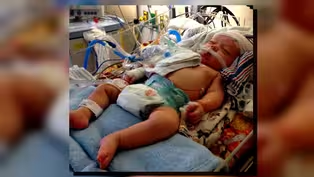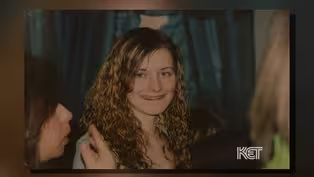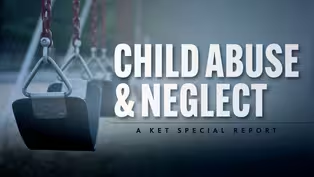Mandy Colwell
Clip | 6m 59sVideo has Closed Captions
Mandy Colwell shares her story of overcoming addiction and regaining her three children.
Mandy Colwell shares a story of redemption after breaking the cycle of addiction and regaining custody of her three children.
Problems playing video? | Closed Captioning Feedback
Problems playing video? | Closed Captioning Feedback
Mandy Colwell
Clip | 6m 59sVideo has Closed Captions
Mandy Colwell shares a story of redemption after breaking the cycle of addiction and regaining custody of her three children.
Problems playing video? | Closed Captioning Feedback
How to Watch
is available to stream on pbs.org and the free PBS App, available on iPhone, Apple TV, Android TV, Android smartphones, Amazon Fire TV, Amazon Fire Tablet, Roku, Samsung Smart TV, and Vizio.
I was in and out of foster care for the first two years of my life, and then I ended up going and staying with my dad and my step mom until I was about ten years old.
Then I got a little complicated and a little I don't know how to word it, but I was just difficult as a child, so I ended up going and staying with my mom and that was a rough situation.
So I start to run away and was put in foster care, and I was in and out of that for the last four years of my, you know, teenage hood.
And we were always users of some sort.
But things got a little tougher dealing with stuff.
And then we were around people that weren't the best for us.
And so we ended up using hard drugs.
And, you know, we ended up going down a road that we shouldn't have went down, and that led to them being taken.
We ended up we were staying in a house that we were renting, but we ended up losing that.
So we were bouncing back and forth from couch to couch.
And then we also lived in our van for a while.
I was actually arrested for shoplifting, and then a day later my husband was trying to go get money to get me out of jail and ended up having a heart attack and rent.
The van, ran off the road and that's when somebody called the police and they were taken.
Riley was he was three years old and Chase was a year and a half, and Jayden would have been see three, four, sorry, six.
He was six years old.
Oh, it was heartbreaking.
And I was very angry.
I was very, very angry.
I didn't think that anything like that would ever happen because I tried to promise myself that nothing like that would happen.
They wouldn't go through what I went through as a child.
So, you know, I just didn't know what to do.
I had felt like I lost everything.
So what else was there to lose?
And it just it it made me go further down that path that I knew I shouldn't be going down.
But it was it was just how it happened for me, you know, the anger.
I couldn't hold on to it because I had to come to a point when I realized that it was the choices that I made that caused the situation.
And it was just a matter of accepting that and working through it.
And after that, it was easy for me to to take accountability for my actions.
I believe them being around us, we weren't ourselves, so we did do things that we shouldn't have done in front of them.
We would fight and and they were exposed to a lot of unsavory people.
So, yes, there there were dangers.
I completely understand why.
I understand that it was in the best interest of the boys to be taken.
And that was the most important thing in the situation.
They were the most important thing in that situation.
We were separated for two years and it was to the point where I could see a Pampers commercial on the TV and I would start crying.
I wanted desperately to be there for them, but it was just very, very difficult to get away from the situation that we were in.
Me and my husband were actually in a fight and I was tired of waking up every day worrying about where we were, you know, where we were going to make our money to be able to use again that day.
And I was just tired of it.
And it was just like something clicked that I can go to another place and not have to worry about the things that I was worrying about, where I was at.
It was my family.
I mean, to know because they were supporting us, telling us, you know, come here and we'll help you.
Come here.
You don't have to live that life anymore.
And for them to do that, it it helped me have that aha moment when I knew I was fighting, you know, totally wrong.
They were always there for me regardless.
My dad and my step mom, they were there.
It was just we you know, they lived a certain life that we just didn't live and they had to step away from it.
And finally, when we decided not to live the life that we were living anymore, for them to step up, it was it was awesome.
You know, it If we just have somebody there for us to back us up and and know that we're worth it and believe in us, it makes a world of difference.
I mean, for me, it was church and the community that came with church.
They, you know, got behind us and realized that we were worth investing in.
And that's when they stepped up and they helped us come up to where we are now.
We ended up getting this house and we had nothing at all, just the clothes that we had.
And everybody pulled together.
And I mean, they furnished the entire house to the bed that we slept on, the couches we sat on, and it made us feel really good that that people were willing to do something like that.
For us, it was mainly family, really.
I mean, we never really we didn't use any type of rehabs or anything like that.
It was just having the community behind us knowing that we were worth it is really what made the difference for us.
I think it's a matter of reaching out because there are supports out there.
It's just a matter of finding them.
But a lot of people are running into a situation to where nobody believes and nobody has that compassion for them.
They think that it's a moral failing to be an addict when it's really not there.
Romeo Addicts are really good people.
It's just we make poor choices and we go down a path that we shouldn't go down.
But if you were actually to have the compassion for them and understand that this is a disease, then I mean that that's really what people need.
Do it.
Do it for yourself.
Don't do it for anybody else.
Do it for yourself because you deserve a better life.
You know, you deserve to have good things in life and you can do it.
It's just a matter of that one decision because we're all the way from one decision of a totally different life.
We are worth it.
Birthparents are worth it.
And to keep the family together, that's the major priority in that situation, to be able to have that reunification and the family as a whole, that's the main goal.
I'm most grateful for God.
I'm most grateful for my family and friends and community.
That's what helped us and that's what can help more people.
Video has Closed Captions
Clip | 6m 59s | Mandy Colwell shares her story of overcoming addiction and regaining her three children. (6m 59s)
Video has Closed Captions
Clip | 14m 50s | Liz Renner describes how her son, Colton, survived the deadliest type of physical child. (14m 50s)
Video has Closed Captions
Clip | 35m 14s | Laken Albrink recounts her heartbreaking experience of sexual abuse from a close relative. (35m 14s)
Child Abuse and Neglect: A KET Special Report - Preview
Video has Closed Captions
Preview | 40s | Preview of Child Abuse and Neglect: A KET Special Report. (40s)
Providing Support for PBS.org
Learn Moreabout PBS online sponsorship
- News and Public Affairs

Top journalists deliver compelling original analysis of the hour's headlines.

- News and Public Affairs

FRONTLINE is investigative journalism that questions, explains and changes our world.












Support for PBS provided by:



